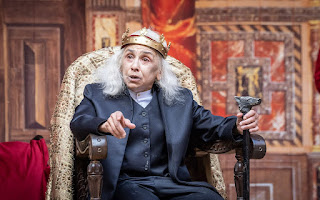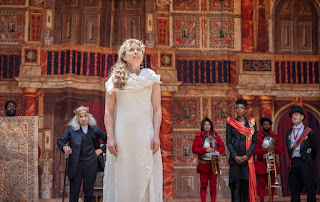On the other hand, Issam Al Gussain having to step in (very confidently) for a number of small roles for tonight's performance was much more par for the course for 2022 - shows without someone reading in a part are the exception now. But in the touch of bad luck that most feels like it's affected the production, it lost its director Helena Kaut-Howson halfway through rehearsals, as she's recovering from a car accident and was unable to return; the Globe website informs us the company did their best to bring the rest of the show together without her.
And though there are good moments, I can't say the lack of a unifying approach to the play isn't apparent. Lear is a role that's sometimes known for taking a while to warm up, as actors save their energy for later, but I was surprised to see Hunter fall into that category, and it took me a while to get a handle on her approach. Seemingly taking his whole court by surprise, Lear shares out his kingdom to his daughters according to who can flatter him the most: The slippery Goneril (Ann Ogbomo) and Regan (Marianne Oldham) get half each, the blunt Cordelia (Michelle Terry) gets nothing. When the king, now in name only, expects his daughters to continue to pander to his (often dangerous) wishes now he's given up power, he finds out just how much their words were worth.
Hunter's take is one where there's actually very little difference in Lear between his "sanity" and his "madness," in fact if anything the latter allows him to reach some level of introspection he never bothered with in his life before. Given ultimate power by an accident of birth he's actually a particularly foolish man: Of course he casually gives up his power and expects to keep his privilege, it's never occured to him that the two might be connected. Perhaps the more accurate description is child-like, the man who "madest thy daughters thy mothers" is like an overgrown toddler, whom we first meet getting a pat on the head for playing "Twinkle, Twinkle, Little Star" on the recorder (a clever choice of tune in a play whose characters constantly blame their fates and actions on their astrological signs.)
The other star turn is of course Michelle Terry, the Artistic Director's annual onstage appearance seeing her do a piece of doubling I tend to think was probably the original intention*: Terry's Cordelia is more robust than most, turning on her sisters in fury when she's cast out, and making her transformation into a military leader at the end more plausible. As the Fool, in Pierrot makeup that seems to consciously call back to her Hamlet, she's still a no-nonsense presence, this time keeping Lear going with both criticism and encouragement, until the problem of the character's disappearance is solved by having him die of exposure after the storm. She's also very good, in a venue she must know like the back of her hand by now, at making the comedy lines actually land and get laughs.
The play is one that weaves its subplot very much into its main plot, the story of the Duke of Gloucester (Diego Matamoros) mirrors Lear's but replacing daughters with sons: Gloucester implicitly trusts the flamboyant but treacherous Edmund (Ryan Donaldson) over the dull but loyal Edgar (Kwaku Mills.) In recent years I've seen some attempts to take Edgar away from the bookish stereotype but Mills' performance goes right back the other way to make him the geekiest version I can remember seeing. Even in his Poor Tom disguise he can't cover up his ineffectiveness, and ends up killing Max Keeble's Oswald more by accident than design. (I can't comment on his killing of Edmund because from where I was sitting it was behind a pillar.) It's a performance I didn't really get, to be honest.
Pawel Dobrzycki's set design pulls a similar, if less dramatic, trick outdoors as Swive did indoors, with a curtain showing the Globe stage in all its pomp being drawn back to show the kingdom being precariously propped up behind the scenes. Some of the costumes are a bit too on-the-nose though - Edmund's black leather outfit for his introduction is pure panto villain. There's a hint of the military to the pomp of Goneril and Regan's outfits though, and for some reason productions at the Globe always seem to particularly highlight the way that, while the older daughters may be awful people and Regan is an outright sadist , they're also 100% right in their central objection to Lear's indulgences: Having two rival armies living under the same roof is a terrible idea, even before you get to one of them being almost permanently drunk, and commanded by a volatile old man with a history of turning on people suddenly.
There are some interesting ideas - Regan's being initially horrified by the blinding of Gloucester before it wakes something sadistic in her; Oswald perhaps being appalled by his masters' actions but being too far in their crimes to stop now - and Hunter's performance does have some standout moments. But her signature physical performance style is missing, presumably because her unusually gymnastic abilities would contrast with the fragile old man she's playing. But it does seem to have had the opposite effect, and without her transformational skills highlighting her own size and vulnerability, some of the emotional connection seems to be gone as well.
King Lear by William Shakespeare is booking in repertory until the 24th of July at Shakespeare's Globe.
Running time: 3 hours 20 minutes including interval.
Photo credit: Johan Persson.
*the theory that the boy actor playing Cordelia doubled as the Fool explains why they never share any scenes, notably the fact that Lear's constant companion is somehow missing in the opening when he's in his pomp, and then disappears without explanation when it's time for Cordelia to return. This doubling doesn't gel well with the theory that the older comedian Robert Armin originated the Fool, but it does fit better with all the "nuncle" references that suggest a young Fool.







No comments:
Post a Comment